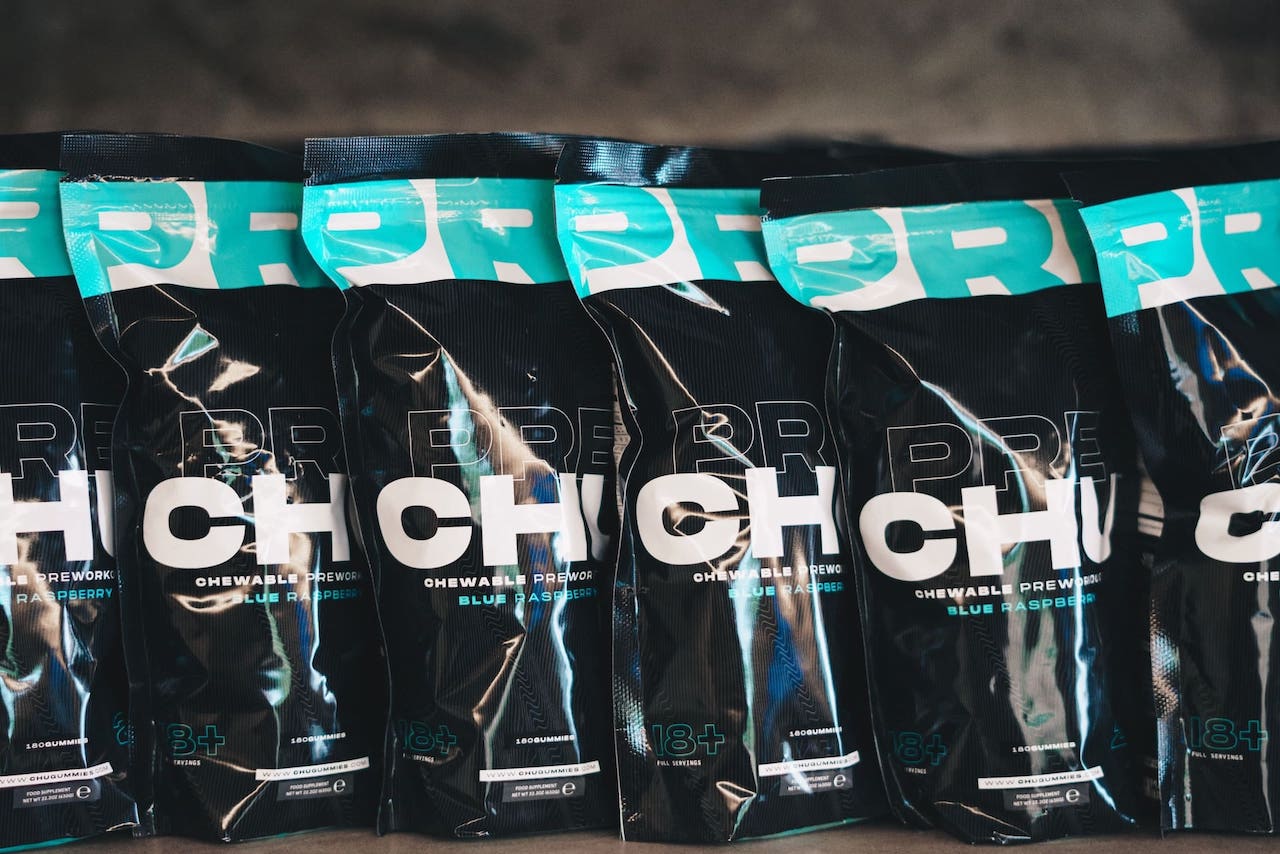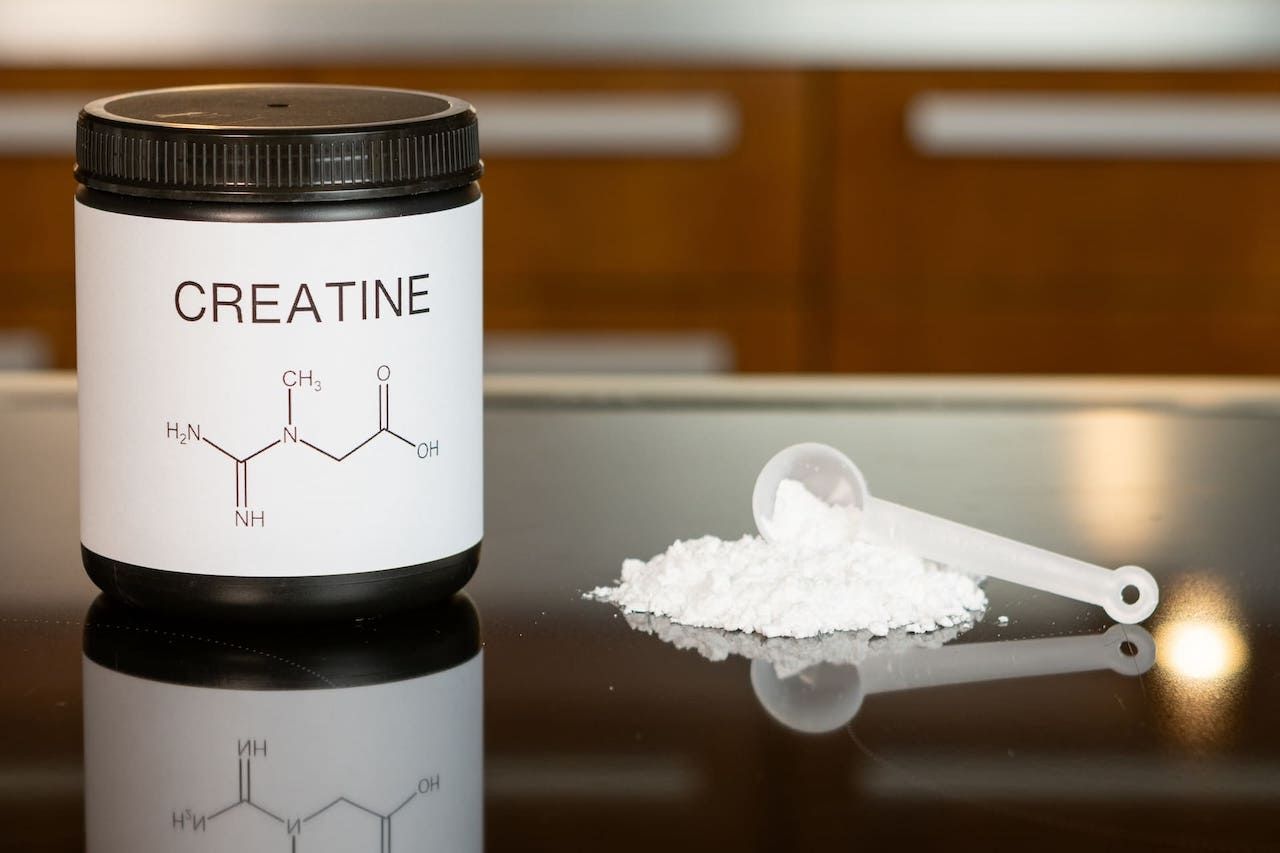What is pre-workout & how does it work?
Learn the benefits and usage of pre-workout and understand how it can help your exercise to boost your performance & get better results.

Source: Unsplash
In recent years, the buzz surrounding pre-workout supplements has been growing louder within the fitness community. It seems like everyone, from the newbie at the gym to the seasoned athlete, has a trusty pre-workout blend they swear by.
These supplements are hailed for their ability to elevate workouts, pushing individuals beyond their usual limits. But what exactly is lurking within those brightly coloured powders and liquids? And how do they promise to transform your gym experience? That’s exactly what we’re diving into today.
This article aims to demystify pre-workout supplements, shedding light on their components, benefits, and how they work their magic. Whether you’re looking to break through a performance plateau, or merely curious about what the fuss is all about, there’s something here for you.
As we delve into the nitty-gritty of pre-workouts, we’ll explore common ingredients and understand the science behind that extra ‘oomph’ they provide.
The objective here is simple - to empower you with the knowledge you need about pre-workout supplements. So the next time someone brings up the topic, you’re not just nodding along, but engaging in an informed discussion.
Or better yet, making a well-educated decision on whether to incorporate pre-workout supplements into your fitness routine!
Definition of pre-workout
Now that we’ve dipped our toes into the vibrant world of pre-workout buzz, let’s dive into what these supplements actually are.
Pre-workout is a type of dietary supplement taken before exercise to boost your performance and make your workout feel less like a chore and more like a thrilling challenge. It’s like the hype man for your workout routine, prepping you for the show.
Pre-workout supplements come in various forms – powders you can mix into a drink, pills, or liquids ready for consumption. The beauty of this variety is it caters to all preferences.
Some folks love the ritual of mixing a powder, while others prefer a quick gulp of a pre-mixed liquid or a pill on the go. There’s a form to fit every lifestyle, making pre-workouts a convenient choice for many.
Each form has its own set of pros and cons. Powders, for instance, are versatile and can be tweaked to get the consistency you like, but they require a bit more prep time. Pills are the epitome of convenience but offer less room for customization. Liquids are a middle ground, ready to drink, yet still offering a bit of flexibility in terms of dosage.
At its core, a pre-workout supplement aims to prep your body and mind for the workout ahead, creating an optimal environment for muscle endurance, strength, and growth. It’s like giving yourself a head start in a race. And who wouldn’t want that extra edge?
Common ingredients found in pre-workout supplements
Entering the world of pre-workout supplements can be like exploring a garden full of different plants. The ingredients list on the bottles may seem very long, each claiming to help improve your exercise routine.
But, among all these ingredients, there are a few that are usually found in many pre-workout mixes. Let's look into these common ingredients and see how they claim to help you do better in the gym.
1. Caffeine
Known for its energy-boosting properties, caffeine is a staple in many pre-workout supplements. It's like the morning alarm that kicks you into action.
A moderate dose of caffeine can significantly enhance your alertness and focus, making those early morning or post-work gym sessions less daunting.
- Purpose: Boosts energy and alertness.
- Benefits: Improves mental clarity, lowers pain perception, enhances blood flow, and potentially assists in muscle contractions [1].
- Optimal Dose: 200-500 mg or 1.8-2.7 mg per kg of body weight [2].
2. Beta-Alanine
This type of amino acid is like the endurance coach you never knew you needed.
Beta-alanine helps buffer the acid in your muscles, allowing you to work out longer before feeling fatigued. It's often included in pre-workout supplements to boost muscle endurance
- Purpose: Raises muscle carnosine concentrations to help with muscle endurance.
- Benefits: Reduces fatigue, improves exercise capacity and performance [3] [4]
- Optimal Dose: 3.2-6.4 grams per day [5]

Source: Unsplash
3. Creatine
Creatine steps in as your strength trainer, supporting muscle strength and power. It helps your muscles produce energy during heavy lifting or high-intensity exercise, making it easier to push through that extra rep or set.
- Purpose: Supports muscle strength and power.
- Benefits: Increases muscle mass, boosts energy levels, and helps muscle cells produce more energy [6] [7].
- Optimal Dose: 3-5 grams per day [8]
4. Branched-Chain Amino Acids (BCAAs)
Meet the recovery agents - leucine, isoleucine, and valine. These essential amino acids aren’t produced by your body, so they must come from your diet or supplements. BCAAs fuel your muscles during workouts and aid in recovery by reducing protein breakdown.
- Purpose: Aids in muscle recovery and growth.
- Benefits: Increases muscle growth, provides an immediate energy source during high-intensity workouts, reduces muscle fatigue, and improves muscle recovery and repair [9] [10].
- Optimal Dose: The dosage can vary based on factors like your weight, workout intensity, and overall diet. However, a common range is between 6-10 grams after workouts [11], or 20-30 grams per day with 5 grams pre-workout and 5 grams post-workout [12].
5. Nitric Oxide Precursors (e.g., L-arginine, L-citrulline)
These substances help your body produce nitric oxide, a compound that widens your blood vessels, allowing for better blood flow and nutrient delivery to your muscles.
It's like opening up the highway during rush hour, making sure everything gets to where it needs to be on time
- Purpose: Improve blood flow.
- Benefits: Enhances oxygen and nutrient delivery to active muscle tissues, boosts overall athletic performance, and reduces muscle soreness [16].
- L-arginine Optimal Dose: The recommended dose ranges from 3-6 grams per day, with some suggesting a higher dose for enhanced benefits [17].
- L-citrulline Optimal Dose: 6-8 grams per day is recommended for exercise performance [18].
6. Taurine
Known for its hydration and muscle function benefits, taurine is like your in-gym waterboy, keeping things fluid and functional as you power through your workout.
- Purpose: Aids in hydration and muscle function.
- Benefits: Increases energy production, improves endurance during exercise, and may aid in weight loss [19] [20].
- Optimal Dose: Effective dosing starts at 1-3 grams per day, taken acutely across a span of 6-15 days, 1-3 hours before an activity. A starting dose of 2 grams can also be effective and can be adjusted based on individual response and tolerance [21].
7. Vitamins and Minerals (like B vitamins for energy production)
B vitamins, in particular, are often included for their role in energy production. They act like the backstage crew, ensuring the show runs smoothly by supporting your body’s energy production mechanisms.
Read more: Top 5 most effective muscle-building supplements

Source: Unsplash
4 benefits of using pre-workout
Stepping into the gym with a vial of pre-workout in your system is like turning the dial up on your workout intensity. It’s the spark that lights the fire, gearing you up for an explosive session.
But how exactly does this mysterious powder do its magic? Let’s break down the benefits.
1. Enhanced performance and endurance
One of the main selling points of pre-workout supplements is their ability to ramp up your performance.
Whether it's lifting heavier weights, executing more reps, or sprinting at a faster pace, pre-workout is there to push you through. The ingredients like caffeine and beta-alanine play a pivotal role here.
Caffeine, a central nervous system stimulant, is known to improve focus and energy, acting as the fuel to your fire [22]. On the other hand, beta-alanine helps delay muscle fatigue, allowing you to train harder and longer [23].
2. Increased energy and focus
We’ve all had those days where the mind is willing, but the body just won’t cooperate.
Pre-workout supplements come to the rescue by boosting your energy levels and sharpening your focus. The caffeine content is largely to thank for this, keeping you alert and on the ball, ready to tackle each set with gusto [22].
3. Faster recovery post-workout
The goodness of pre-workout supplements extends beyond the gym. They aid in faster recovery, helping to repair muscle tissue and reduce soreness.
This is thanks to the Branched-Chain Amino Acids (BCAAs) and other essential nutrients that work to replenish the muscles and get you ready for your next workout session [24].
4. Potential for greater muscle gains
By enhancing your performance, pre-workout supplements create a conducive environment for muscle growth. The improved endurance allows for a more intensive workout which, in turn, can lead to increased muscle mass.
Studies have highlighted short-term increases in lean body mass and lower body strength with consistent use of pre-workout supplements [25].
These benefits paint a tempting picture of what pre-workout supplements can bring to the table. However, it’s important to note that while they can provide a substantial boost, nothing replaces a well-rounded diet and a solid training regimen.
So, the next time you find yourself dragging your feet towards the gym, a dose of pre-workout might just be the pick-me-up you need to reignite that training spark!

Source: Unsplash
Potential side effects and considerations
While the allure of heightened energy and focus might beckon many fitness enthusiasts towards pre-workout supplements, it's wise to tread with a full understanding of the potential side effects.
Yes, these supplements can be the rocket fuel to your workout shuttle, but like any fuel, they need to be handled with care. Let's walk through some of the common side effects and considerations you should bear in mind.
1. Over-stimulation or jitters from caffeine
Pre-workout supplements often come loaded with caffeine, a stimulant well-regarded for its ability to kickstart our energy and focus.
However, too much caffeine can lead to jitteriness, restlessness, and even anxiety [26]. It’s like having one too many cups of coffee and feeling your heart race a tad bit faster.
2. Potential for increased heart rate or blood pressure
Alongside the jitters, an elevated heart rate or blood pressure is something to be mindful of, especially for individuals with pre-existing cardiovascular conditions.
In fact, a small-scale study pointed out that even healthy individuals could experience a rise in diastolic blood pressure post the consumption of pre-workout supplements [27].
3. Itchy or tingly skin sensation from Beta-Alanine
Beta-alanine, another common ingredient in pre-workouts, can cause a tingling or itching sensation on the skin. While it's harmless and usually subsides on its own, it might be an uncomfortable experience for some [28].
4. Digestive upset or discomfort
Some individuals might experience nausea or other digestive issues post pre-workout consumption. It's essential to follow the recommended dosage and perhaps even start with a smaller dose to gauge your body's reaction [29].
5. Importance of checking ingredient list for allergens or intolerances
Before you jump on the pre-workout bandwagon, take a moment to scrutinise the ingredient list. Ensure it doesn't contain anything you're allergic to or intolerant towards. It’s always a good practice to know what you're fueling your body with.
6. Other considerations
- Dosage: Stick to the recommended dosage, and consider consulting with a healthcare professional if you're unsure.
- Timing: Avoid taking pre-workout supplements too close to bedtime as they could interfere with sleep due to their caffeine content.
- Dependency: Be mindful of developing a dependency on pre-workout supplements for energy. Natural energy sources and a balanced diet should be the priority.
Pre-workout supplements can indeed be a game-changer in your fitness journey. However, being informed about their potential side effects and handling them with care is the key to reaping the benefits while minimising risks.
Your safety should always be the front runner in the race towards achieving your fitness goals.
4 tips for using pre-workout safely
Now that we’ve navigated through the energising upsides and the cautionary downsides of pre-workout supplements, it’s time to explore how to use them safely.
After all, it's not just about what you take, but how you take it. Here are some friendly pointers to ensure that your pre-workout supplementation is both effective and safe.
1. Start with a half dose to assess tolerance
Before going full throttle, it's wise to test the waters with a half dose. Every body reacts differently to supplements, and it’s vital to understand how yours responds to pre-workout.
This way, you can avoid unpleasant surprises like jitteriness or digestive discomfort.
2. Avoid taking it too late in the day
Pre-workout supplements are like an espresso shot for your workout. However, just like coffee, they can interfere with your sleep if taken too late in the day.
It's usually best to consume pre-workout supplements several hours before bedtime to ensure they don’t keep you tossing and turning.
3. Cycle off occasionally to prevent dependency
Your body is a smart machine that adapts to regular stimuli. Taking pre-workout supplements continuously can lead to a build-up of tolerance, meaning you might find yourself needing more to feel the same effect.
Cycling off every few weeks helps keep your body responsive and prevents dependency.
4. Consult with a healthcare professional or nutritionist
Before introducing any supplement to your routine, it's a prudent step to consult with a healthcare professional or a nutritionist. They can provide personalised advice based on your health status and goals.
Moreover, if you’re on medication or have pre-existing health conditions, it’s crucial to ensure there won’t be any adverse interactions.
Conclusion
Pre-workout supplements are not just about that extra push they give; they’re about making informed choices to optimise your workout while safeguarding your health. As tempting as it is to chase the exhilarating rush of energy, it’s the knowledge and the prudent approach towards these supplements that make the real difference.
The allure of enhanced performance, increased energy, and quicker recovery is hard to resist. However, now that you're armed with a balanced understanding, you can navigate through your fitness journey with an added layer of insight.
Whether you decide to incorporate pre-workout supplements into your regimen or opt for natural alternatives, the choice is personal and should resonate with your fitness ethos.
Remember, the path to achieving your fitness goals is a marathon, not a sprint. It's about sustainable practices that complement your body's needs and your long-term health.
So, whether you choose to dive into the world of pre-workout supplements or not, ensure that your choice is well-informed and aligns with your broader health and fitness vision.
Cheers,
Friska 🐨
Read next: Bodybuilding meal plan: What you should eat and what you should avoid
FAQs (Frequently Asked Questions)
1. What is a pre-workout supplement?
Pre-workout supplements are formulated to boost energy, focus, and endurance during workout sessions. They often contain ingredients like caffeine, beta-alanine, and creatine to help enhance performance and reduce muscle fatigue.
2. When should I take pre-workout?
It's typically recommended to take pre-workout supplements 30 to 45 minutes before your workout. However, the exact timing can vary based on individual tolerance and the specific supplement. Always follow the instructions on the product label or consult with a healthcare professional.
3. What are the benefits of using pre-workout supplements?
Pre-workout supplements can enhance workout performance, increase energy and focus, aid in faster recovery post-workout, and potentially lead to greater muscle gains when used consistently alongside a balanced training routine.
3. Are there side effects to taking pre-workout?
Yes, some individuals may experience side effects like jitteriness, increased heart rate, digestive upset, or a tingling sensation on the skin. It's essential to follow the recommended dosage and consult with a healthcare professional if you have any concerns.
4. Can I take a pre-workout every day?
The answer to this may vary based on individual tolerance and the specific supplement. It's advisable to cycle off pre-workout supplements occasionally to prevent building up a tolerance. Consulting with a healthcare professional for personalised advice is also recommended.
5. What are some natural alternatives to pre-workout supplements?
Natural alternatives to pre-workout supplements include caffeine from natural sources like coffee or tea, carbohydrates for energy, beet juice for improved blood flow, and proper hydration to support overall performance.
6. Can I mix pre-workout supplements with other supplements?
It's crucial to exercise caution when mixing supplements as certain combinations can lead to adverse effects. It's always best to consult with a healthcare professional or nutritionist before mixing pre-workout supplements with other supplements.
Source:
